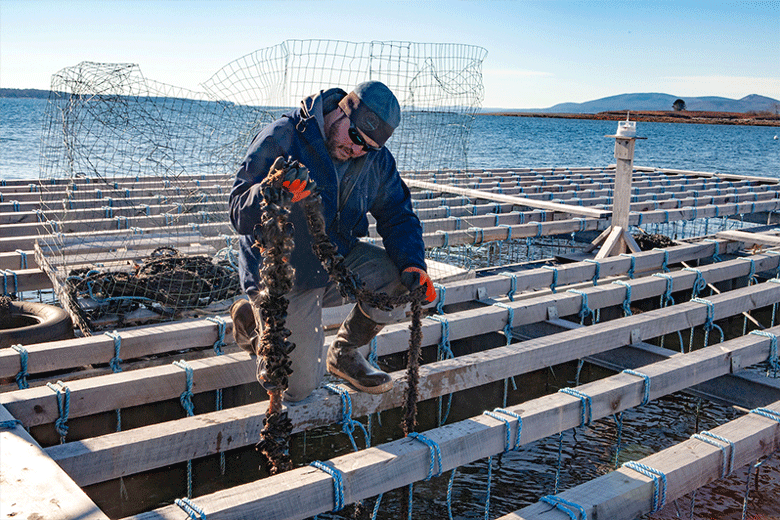An article in the February/March issue The Working Waterfront outlined the fact that an increasing number of coastal towns in Maine fear, and are interposing regulatory measures that bar or limit, new and/or expanded aquaculture activities in their respective towns (“Towns fear, fight aquaculture expansion”).
Similar (and somewhat stronger) views were expressed in a recent Portland Press Herald article that on one hand supported traditional, small-scale, locally owned aquaculture activities, but on the other was wary (seemingly to the point of exclusion) of larger-scale corporate aquaculture undertakings that may or may not be rooted in Maine.
In my view, we need to get over these fears. Expanded aquaculture activities, including farming, harvesting, and processing of seaweed, salmon (and other finfish), clams and related shellfish are an extension of, and the logical future of Maine’s historic fishing, clamming, and lobstering activities.
Aquaculture builds on a historic base of marine-related activities…
Global warming, the warming of Maine’s nearshore waters, coupled with overfishing by small, historically unregulated boat owners, are irrefutable factors in the decline of traditional fishing activities.
Groundfishing will never be what it once was, and traditional lobstering is under increasing pressure to limit the location, gear used, and annual take of this marine resource. Annual take is also threatened by the inexorable movement of spawning lobsters to colder northern and eastern waters. The geographic center for lobstering on the East Coast is (or soon will be) Hancock and Washington counties in Maine and eastern Canada.
Expanded aquaculture activities in Maine (some by large corporations) can/will replace jobs being lost by declining employment in traditional fishing/lobstering activities. By utilizing offshore waters and land-based facilities to grow (in controlled settings) and process a variety of marine organisms, aquaculture will produce new employment opportunities.
Further impetus for aquaculture growth is the growing global need/demand for marine (protein-laden) food products, and for an expanding array of non-food products (fertilizers, cosmetics) that derive from harvested seaweed. Some seaweed extracts are today being used as thickening agents in pharmaceutical and biotechnological applications.
Our fears must be tempered by several realities.
First, global warming is not going away. Marine scientists and oceanographers tell us this warming will continue for years and decades to come. This will further reduce Maine’s traditional fishing and lobstering activities.
Second, romanticizing the virtues of small-scale, locally owned fishing and aquaculture activities serves no one’s interest—left to their own devices, local small-scale fishermen over-fished; independent clammers and wormers over-harvested; and first-generation aquaculture activities (with no security to operate in a fixed offshore water area) struggled to survive.
In the early 1970s the regulatory powers of Maine’s Department of Marine Resources were strengthened. This was seen as essential to stop overfishing by small independent boat owners, to stop overharvesting by small independent harvesters of clams and worms, and to breathe life and order into small first-generation aquaculture activities. DMR could now grant secure leases to defined water and seabed areas.
Third, bigger is not inherently bad—L.L. Bean and BIW are examples staring us in the face. Larger aquaculture entities can realize economies of scale. They are more likely to not only to grow and harvest a product, but also engage in the more lucrative “value add” of processing and shipping a growing range of marine products into national and global markets. This translates into more jobs in Maine.
Moreover, we should bear in mind that DMR’s statewide powers to regulate extend to corporate entities of every size. This agency is in a far better position than individual towns to monitor, regulate, and license the larger-scale aquaculture activities that seek a place along Maine’s coast.
It has the technical staff, the jurisdictional reach, the legal power, and an enforcement apparatus in the Marine Patrol to regulate as fully as necessary individual or corporate entities that seek to utilize Maine’s shoreland, intertidal land, and submerged land for fishing, harvesting, or aquaculture activities.
Fourth, we need to realize that we have a lot of shoreland. We control a lot of ocean.
There is ample room to protect small-scale marine organism growers and harvesters and at the same time make room for larger-scale operations with the capital resources needed to build today’s modern aquaculture facilities in a responsible manner and then to market their products nationally and globally.
In short, we need to get over our fears and our tendencies toward parochialism. Aquaculture builds on a historic base of marine-related activities and is good economics looking to the future. In Iowa, they know corn; in West Virginia, they know coal; in Texas, they know cattle. In Maine, we know the sea and marine organisms.
We can control and will benefit from a healthy and growing range of aquaculture activities. We can do this.
Orlando Delogu is a 57-year resident of Portland who taught law at the University of Southern Maine for 40 years. His law expertise includes environmental and land use, and he has served on Maine’s Board of Environmental Protection, the Portland City Council, and the Portland Planning Board.





